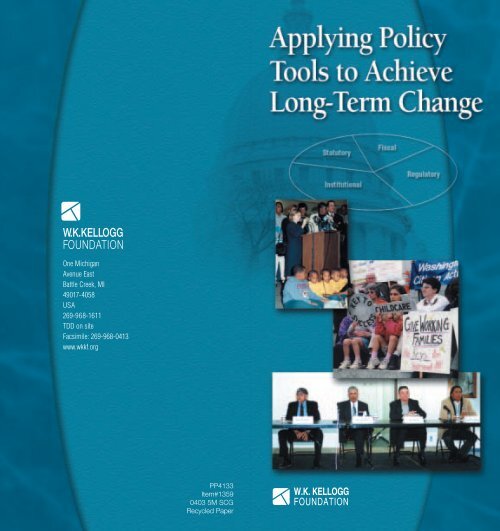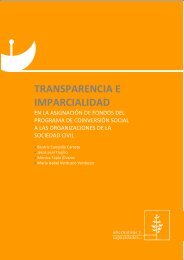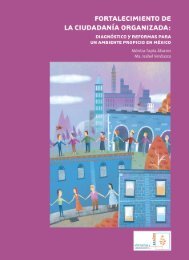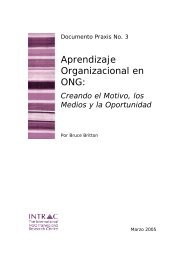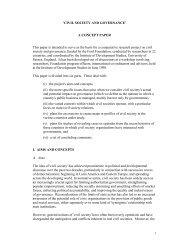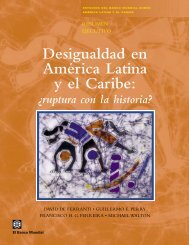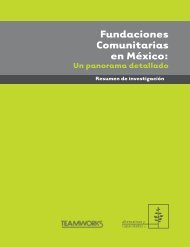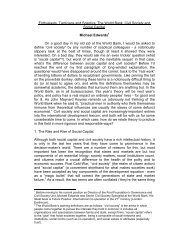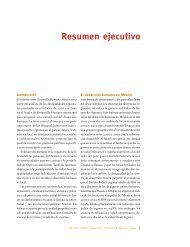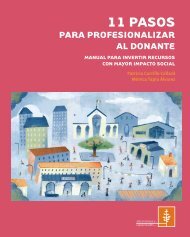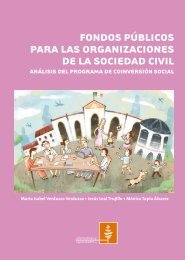Applying Policy Tools to Achieve Long-Term Change
Applying Policy Tools to Achieve Long-Term Change
Applying Policy Tools to Achieve Long-Term Change
You also want an ePaper? Increase the reach of your titles
YUMPU automatically turns print PDFs into web optimized ePapers that Google loves.
W.K.KELLOGG<br />
FOUNDATION<br />
One Michigan<br />
Avenue East<br />
Battle Creek, MI<br />
49017-4058<br />
USA<br />
269-968-1611<br />
TDD on site<br />
Facsimile: 269-968-0413<br />
www.wkkf.org<br />
PP4133<br />
Item#1359<br />
0403 5M SCG<br />
Recycled Paper<br />
W.K. KELLOGG<br />
FOUNDATION
Guiding Principles for <strong>Policy</strong><br />
• <strong>Policy</strong> work supports the achievement<br />
of our programmatic goals.<br />
• Effective policy reforms grounded in<br />
the experiences and knowledge of our<br />
community partners.<br />
• Community voices should be prevalent<br />
in the policy debates, particularly those<br />
without past access <strong>to</strong> the policy process.<br />
• Use of W.K. Kellogg Foundation resources<br />
<strong>to</strong> influence public policy efforts must<br />
comply with federal regulations.<br />
<strong>Applying</strong> <strong>Policy</strong><br />
<strong>Tools</strong> <strong>to</strong> <strong>Achieve</strong><br />
<strong>Long</strong>-<strong>Term</strong> <strong>Change</strong><br />
Addressing the ways policies shape,<br />
hamper, or encourage social progress is<br />
integral <strong>to</strong> the Kellogg Foundation’s work<br />
in each program and geographic area. The<br />
Kellogg Foundation has long supported the<br />
efforts of grantees <strong>to</strong> realign public and private<br />
systems <strong>to</strong> benefit the quality of community life.<br />
An effective <strong>to</strong>ol in achieving community goals<br />
and sustaining systems change, policy can<br />
facilitate the work of grantees <strong>to</strong> affirm the<br />
capacity of community-based leaders, sustain<br />
successful activities, and support communities<br />
and change agents’ work <strong>to</strong> align institutions<br />
and practices with community needs. It provides<br />
a platform for inclusion of diverse voices and<br />
perspectives working <strong>to</strong>gether for systemic<br />
change <strong>to</strong> improve the quality of life for youth,<br />
families, and their communities.<br />
<strong>Policy</strong> education is often thought of only<br />
in terms of legislation; but as practiced at the<br />
Kellogg Foundation, it is much more multifaceted.<br />
“<strong>Policy</strong>” also refers <strong>to</strong> that body of<br />
information that is developed and applied in<br />
regula<strong>to</strong>ry actions; budgetary decisions and<br />
public agency practices; court decisions and<br />
rules; private institutional governance; and the<br />
1
formal policy positions of educational, religious,<br />
civic, or professional organizations. <strong>Policy</strong><br />
programming activities may focus on shaping<br />
new policy, strengthening or implementing<br />
practices, reshaping programs, or assuring<br />
accountability through moni<strong>to</strong>ring for policy<br />
effectiveness and improvement. <strong>Policy</strong> reform<br />
and public policy decisions happen at every<br />
level of government.<br />
While not all our grants require an<br />
intentional strategy <strong>to</strong> inform policy, we know<br />
that activities that positively affect policymakers<br />
are essential <strong>to</strong> strengthening the impact of our<br />
work and sustaining systemic reforms over the<br />
longer term.<br />
This brochure is designed <strong>to</strong> describe how<br />
the Kellogg Foundation applies policy principles<br />
and <strong>to</strong>ols <strong>to</strong> accomplish our programming goals<br />
and objectives. Examples from each of our<br />
programming units and strategic initiatives<br />
highlight ways grantees have successfully used<br />
policy work <strong>to</strong> achieve community goals and<br />
produce sustainable systems change. Following<br />
the Guiding Principles for <strong>Policy</strong> Work, policy<br />
activities highlighted include:<br />
• Connecting Community <strong>to</strong> Policies (pg. 6);<br />
• Developing Models <strong>to</strong> Demonstrate Ideas (pg. 8);<br />
• Partnering with Government <strong>to</strong> Catalyze<br />
Action (pg. 9);<br />
• Building Relationships and Opportunity<br />
through Networking (pg. 11);<br />
• Developing Traditional and Non-Traditional<br />
Leaders (pg. 12);<br />
• Convening Stakeholders <strong>to</strong> Find Common<br />
Ground (pg. 13); and<br />
• Educating <strong>Policy</strong>makers and <strong>Policy</strong><br />
Influentials (pg. 14).<br />
Guiding Principles<br />
for <strong>Policy</strong> Work<br />
The Kellogg Foundation’s policy work has<br />
been grounded in a set of guiding<br />
principles that are carried out in the<br />
United States, Latin America and the Caribbean,<br />
and southern Africa programming regions.<br />
These principles are:<br />
• Foundation-supported policy work always<br />
support the achievement of our programmatic<br />
goals.<br />
• The most effective actions for policy reforms<br />
are grounded in the experiences and<br />
knowledge of our community partners.<br />
• Whenever possible, community voices should<br />
be prevalent in the policy debates, particularly<br />
the voices of those who have not had access<br />
<strong>to</strong> the policy process in the past.<br />
• The use of the Kellogg Foundation’s resources<br />
related <strong>to</strong> public policy efforts must comply<br />
with federal regulations.<br />
2<br />
3
<strong>Policy</strong> change is a means <strong>to</strong> a desired end.<br />
Engagement in policy requires clarity of program<br />
purpose, careful planning, intentional choices,<br />
and continual attention by the Kellogg Foundation<br />
program staff and grantees. While specific actions<br />
<strong>to</strong> achieve the Kellogg Foundation’s policy<br />
objectives may be opportunistic, dependent upon<br />
changing political and environmental contexts,<br />
those actions always link back <strong>to</strong> our program<br />
goals. This requires Program Direc<strong>to</strong>rs and<br />
grantees <strong>to</strong> work <strong>to</strong>gether <strong>to</strong> identify and develop<br />
the policy skills needed <strong>to</strong> achieve the program<br />
outcomes, as well as flexibility in implementing<br />
policy plans <strong>to</strong> be responsive <strong>to</strong> new policy<br />
opportunities as they arise.<br />
<strong>Policy</strong> Activities<br />
Support Program<br />
Strategies<br />
<strong>Policy</strong> Activities reflect the options and <strong>to</strong>ols the<br />
Foundation’s program staff, grantees and their<br />
partners chooses <strong>to</strong> address the program policy<br />
change objectives. Fundamental <strong>to</strong> our approach<br />
is the inclusion of diverse voices and<br />
consideration of multiple perspectives on an<br />
issue. Activities may reflect a wide range of<br />
opportunities for action, including advancing<br />
new concepts, reforming existing standards and<br />
practices, maintaining and strengthening<br />
effective policies and practices, public education,<br />
supporting the dissemination of objective<br />
information <strong>to</strong> strategic audiences and enhancing<br />
the policy capacity of community members and<br />
leaders. Activities must comply with IRS and<br />
Treasury Department regulations for nonprofits<br />
as well as internal Foundation policies. (See<br />
brochure: Guidelines for Informing Public <strong>Policy</strong>).<br />
4<br />
5
Examples from selected programming that<br />
illustrate some of the more successful and<br />
prevalent policy activities supported by the<br />
Foundation include:<br />
Connecting Community <strong>to</strong> Policies<br />
The Foundation’s commitment <strong>to</strong> fully connect<br />
with a community’s vision and values is<br />
fundamental <strong>to</strong> how the Kellogg Foundation<br />
does its work. Rather than unilaterally<br />
developing policy plans for grantees <strong>to</strong> follow,<br />
Foundation staff work with grantees and their<br />
communities <strong>to</strong> develop specific change<br />
objectives. Plans are made with a degree of<br />
flexibility since grantees need <strong>to</strong> be able <strong>to</strong><br />
address emerging issues and meet changing<br />
dynamics within their own communities.<br />
Beginning with the community, a variety of<br />
policy types and approaches may be<br />
implemented.<br />
For example, the Devolution Initiative was a<br />
multi-year partnership of researchers, analysts,<br />
and state and national advocacy organizations <strong>to</strong><br />
develop and disseminate information that<br />
increased local, state, and national capacity <strong>to</strong><br />
inform policy discussions and decisions. One<br />
state grantee partner, the Mississippi Devolution<br />
Partnership enlisted and trained current and<br />
former Temporary Assistance for Needy Families<br />
(TANF) recipients <strong>to</strong> conduct the largest<br />
statewide survey of low-income families in the<br />
country (another example of the use of<br />
evaluation methods and techniques). At the<br />
conclusion of the survey, the interviewers had a<br />
high level of investment, understanding, and<br />
ownership of the information. Subsequently,<br />
armed with their own information and new<br />
confidence and enthusiasm, they became key<br />
ac<strong>to</strong>rs in communicating the results <strong>to</strong> state and<br />
local policymakers and shaping emerging policy<br />
implementation.<br />
Sometimes grantees focused on<br />
administrative or institutional policy change<br />
objectives. The Comprehensive Community<br />
Health Models of Michigan work in Calhoun,<br />
St. Clair, and Muskegon counties was designed<br />
<strong>to</strong> assist communities in building more efficient<br />
and effective health care systems through<br />
community member involvement. In St. Clair,<br />
the grantee partnership was successful in<br />
getting the county Intermediate School District<br />
board and local K-12 districts <strong>to</strong> reverse existing<br />
policies and <strong>to</strong> financially support school health.<br />
6<br />
7
ENLACE (Engaging Latino Communities for<br />
Education), a multiyear initiative <strong>to</strong> strengthen<br />
the educational pipeline and increase opportunities<br />
for Latinos <strong>to</strong> enter and complete college,<br />
uses multiple policy types <strong>to</strong> achieve the desired<br />
outcomes. In Albuquerque, New Mexico,<br />
ENLACE partnerships with parents and<br />
community activists facilitated the Albuquerque<br />
Public School district <strong>to</strong> provide space and assist<br />
with resources for two Family Centers, largely<br />
staffed by parent volunteers <strong>to</strong> address the need<br />
for Hispanic parents <strong>to</strong> become involved in all<br />
aspects of the education of their children.<br />
Developing Models <strong>to</strong> Demonstrate Ideas<br />
The Kellogg Foundation has provided the risk<br />
capital that permits communities <strong>to</strong> redesign the<br />
delivery of public and private services in a way<br />
that meets their own needs, vision, and<br />
expectations. Our policy programming often<br />
includes mechanisms <strong>to</strong> design and test<br />
alternative ways <strong>to</strong> deliver health and social<br />
services, shape educational outcomes, promote<br />
economic and community development, and<br />
strengthen philanthropy and the nonprofit sec<strong>to</strong>r.<br />
Information about new and better methods <strong>to</strong><br />
achieve positive community change is documented<br />
and disseminated <strong>to</strong> policymakers.<br />
The objective of sharing information may be<br />
replication through public funding or the<br />
inclusion of new values and strategies in existing<br />
public programs. Middle Start, a comprehensive<br />
middle-grades improvement initiative, has<br />
resulted in new state and local policies <strong>to</strong><br />
increase the preparation and performance of<br />
middle grades teachers. For example, several<br />
Michigan public school districts have allocated<br />
funds for common planning time for middleschool<br />
teachers. At a different level, the Michigan<br />
Department of Education has approved a middlegrades<br />
teaching endorsement.<br />
Another grantee, the Corporation for<br />
Supportive Housing, working in four Michigan<br />
counties, has become a model for new policies<br />
by the Michigan State Housing Development<br />
Authority for funding community residential<br />
services for adults who are vulnerable due <strong>to</strong><br />
physical, emotional, or intellectual challenges,<br />
age, homelessness, and/or low income.<br />
Partnering with Government <strong>to</strong> Catalyze Action<br />
Investment by the Foundation in areas that have<br />
not received priority attention can bring new<br />
impetus and attention <strong>to</strong> important public<br />
issues. This is the case in the work of dental<br />
and mental health service providers who are<br />
participating in Community Voices. Community<br />
Voices, building from the community level,<br />
gives the underserved a voice <strong>to</strong> help make<br />
health care access and quality part of the<br />
national debate.<br />
By communicating the success achieved by<br />
the grantees <strong>to</strong> key national policymakers, the<br />
Foundation and the Community Voices<br />
partnerships have been able <strong>to</strong> partner with the<br />
8<br />
9
U.S. Surgeon General <strong>to</strong> advance important<br />
action agendas for oral and mental health<br />
services based on community experience. In<br />
addition, the work of Devolution grantees in<br />
facilitating discussions between state and tribal<br />
officials regarding human service programs and<br />
other common issues have resulted in more<br />
equitable policies for tribal members in several<br />
states. In Montana, Washing<strong>to</strong>n and Wisconsin,<br />
these discussions have also resulted in<br />
establishing new procedures for a formal<br />
government-<strong>to</strong>-government relationship<br />
between the state and the sovereign tribes.<br />
Administrative policy changes also result<br />
from grantees partnering with state and local<br />
government. In Pennsylvania, the Institute for<br />
Service Learning worked with the Philadelphia<br />
School District <strong>to</strong> pass a policy integrating<br />
service learning projects in<strong>to</strong> three grade spans<br />
and requiring all schools <strong>to</strong> designate one<br />
teacher in every school building <strong>to</strong> serve as a<br />
service learning coordina<strong>to</strong>r.<br />
Building Relationships and Opportunity<br />
Through Networking<br />
Bringing people <strong>to</strong>gether <strong>to</strong> build relationships<br />
among grantees and policy stakeholders has<br />
been key <strong>to</strong> accomplishing policy change<br />
objectives in several initiatives. One example is<br />
Food and Society (FAS), designed <strong>to</strong> support<br />
the creation and expansion of community-based<br />
food systems that are locally owned and<br />
controlled, environmentally sound, and healthpromoting.<br />
National networks of FAS grantees<br />
and fellows have been formed <strong>to</strong> inform a future<br />
federal food policy that reflects environmental<br />
and conservation values. The Mid South Delta<br />
Initiative is strengthening Delta communities by<br />
connecting them with regional economic<br />
systems and support structures <strong>to</strong> create positive<br />
social and economic impact. They have created<br />
networks connecting the grantees which has<br />
facilitated a sharing of best practices that helps<br />
communities put in<strong>to</strong> place policies that are<br />
already having an impact on the region’s access<br />
<strong>to</strong> capital and workforce.<br />
10<br />
11
Another example is the Michigan Community<br />
Foundations’ Youth Project. Designed <strong>to</strong> raise<br />
community foundation endowment dollars and<br />
involve young people in philanthropy, a project<br />
that promoted a policy change that enabled<br />
young people (16-18 years old) <strong>to</strong> serve as full<br />
voting members of nonprofit boards. Now, more<br />
than 6,000 youth have served on Youth Advisory<br />
Councils of Community Foundation boards –<br />
successfully demonstrating that youth are<br />
effective fundraisers, grantmakers, and<br />
community change agents.<br />
Developing Traditional and<br />
Non-Traditional Leaders<br />
By helping communities learn about public<br />
policy and how they can actively participate in<br />
shaping their own change agenda, the<br />
Foundation is helping assure that those who<br />
previously may not have felt welcome in the<br />
policy arena are taking a place at the table. The<br />
long-term goal is <strong>to</strong> help create an emerging<br />
generation of leaders that reflects the cultural<br />
diversity and richness of our nation.<br />
In terms of traditional leaders, the Kellogg<br />
Foundation has invested in their development<br />
through the Flemming Fellows Program. This<br />
program provides an opportunity for new statelevel<br />
legisla<strong>to</strong>rs <strong>to</strong> hone their decision making<br />
and problem solving skills, as well as <strong>to</strong> think<br />
through the values they hope <strong>to</strong> apply as<br />
policymakers. Most recently funded through the<br />
Devolution Initiative, more than 300 state<br />
legisla<strong>to</strong>rs – representing the full spectrum of<br />
political perspectives – have benefited from this<br />
experience. The Latin America Caribbean team<br />
has supported a similar leadership programming<br />
for newly elected municipal councilors in Brazil.<br />
Convening Stakeholders <strong>to</strong> Find Common Ground<br />
Convening parties with shared interests but<br />
competing agendas so they may examine and<br />
discover common ground and creative solutions<br />
is a function of policy education. In Michigan,<br />
the Foundation’s People and Land project<br />
leaders regularly convene public and private<br />
community decision makers with diverse views<br />
so they may examine information and ideas <strong>to</strong><br />
change business and public practices for the<br />
most effective use of land resources.<br />
12 13
Educating <strong>Policy</strong>makers and <strong>Policy</strong> Influentials<br />
Disseminating lessons learned <strong>to</strong> those who shape<br />
policy is complex and demanding work. It<br />
requires planning, clear messages, time, resources,<br />
and relationships. Yet, it is clearly an investment<br />
worth making. For example, the National<br />
Commission on Service-Learning, a prestigious<br />
nonpartisan group of public and private leaders,<br />
has provided leadership in the area of servicelearning<br />
by widely sharing information and<br />
results of Foundation grantee activities. Students<br />
and their parents from ENLACE-New Mexico<br />
organized a day long information session for<br />
policymakers in the state capi<strong>to</strong>l in Santa Fe <strong>to</strong><br />
discuss both educational challenges of Hispanic<br />
youth and state level policy opportunities. The<br />
ENLACE delegation included a number of<br />
educational leaders including the president of<br />
the University of New Mexico.<br />
14<br />
Evaluation of <strong>Policy</strong><br />
Efforts as a Tool for<br />
Non-Profit Research<br />
Capturing the lessons learned as well as<br />
assessing the effectiveness in achieving<br />
the goals and objectives of grantmaking<br />
is an important part of the Kellogg Foundation<br />
programming approach. The policy aspects of<br />
programming are sometimes difficult <strong>to</strong><br />
evaluate. How do we best measure the value of<br />
the Foundation’s policy education efforts?<br />
Examples of some general evaluation questions<br />
for the policy aspect of programming are:<br />
• Are the grantees able <strong>to</strong> sustain change efforts<br />
though funding streams other than the<br />
Foundation’s investments?<br />
• At the system level, has the knowledge and<br />
experience generated by community grantees<br />
been institutionalized through incorporation<br />
in<strong>to</strong> public or private policies and programs?<br />
• Have project participants gained a voice in<br />
decision making that affects the quality of<br />
their communities and their lives?<br />
Kellogg Foundation programming supports<br />
grantees as they seek positive social change<br />
through appropriate policy and systems change.<br />
How lasting these changes are and how far the<br />
impact extends is the true test of our success.<br />
Reforming and strengthening policy as it is<br />
applied <strong>to</strong> the problems and concerns of<br />
communities is an important test of <strong>to</strong>ols that<br />
the Foundation will use <strong>to</strong> help grantees achieve<br />
and sustain community goals and replicate<br />
successful experiences in other communities.<br />
successful experiences in other communities.<br />
15
<strong>Applying</strong> <strong>Policy</strong><br />
<strong>Tools</strong> <strong>to</strong> <strong>Achieve</strong><br />
<strong>Long</strong>-<strong>Term</strong> <strong>Change</strong><br />
More Information<br />
For additional information on W.K. Kellogg<br />
Foundation programming, write <strong>to</strong>:<br />
W.K. Kellogg Foundation<br />
P.O. Box 550<br />
Battle Creek, MI 49016-0550<br />
Or call our <strong>to</strong>ll-free publication request line at:<br />
(800) 819-9997. Some limitations on quantities<br />
may apply.<br />
Visit our Web site at: http://www.wkkf.org<br />
16


